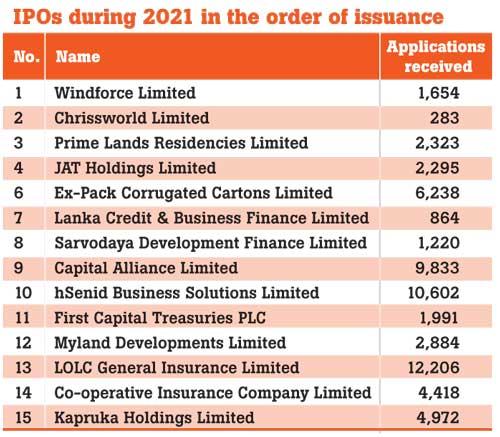13 Jan 2022 - {{hitsCtrl.values.hits}}
Although 2021 ended as the year with a record number of initial public offerings (IPOs), the issuers have failed to appeal to a broader investor base, as none of the IPOs were able to garner subscriptions from a large number of investors.
 The highest number of applications received by an IPO in 2021 was 12,206, while eight IPOs received less than 3,000 applications, raising questions whether the stock market rally set forth since mid-2020 has had any impact on the large majority of the country’s population.
The highest number of applications received by an IPO in 2021 was 12,206, while eight IPOs received less than 3,000 applications, raising questions whether the stock market rally set forth since mid-2020 has had any impact on the large majority of the country’s population.
The stocks were on a bull run in the past two years and the indices recorded double-digit gains in 2021. The All Share Price Index made 80 percent gain in 2021, while the index of the more liquid stocks, S&P SL20, added 60 percent.
However, Mirror Business last week highlighted the sharp disconnect between the country’s stock market and main street market and the stock market rally had entirely left behind the broader public, who haven’t had any chance of enjoying the benefits. Equities have been the winner since the onset of the pandemic, due to a range of factors spanning from ultra-low interest rates, record liquidity, pent-up demand, ban on certain imported goods—which benefited the local companies—and the resultant higher earnings.
However, the extremely narrow participation of the population in the country’s equities market is nothing new or not confined to IPOs but is a perennial issue the stock market has been grappling with. Nevertheless, more Sri Lankans are now trading stocks than before, as particularly in the last two years, a new generation of investors entered the market, perhaps drawn by the attractive valuations and one-way direction of the market. Many middle-income earners, who had their savings accumulated during 2020 and 2021, due to the limited spending opportunities, invested their funds in shares, propelling the growth in the stocks. However, there is some fear among the equity analysts that the current rally could fizzle out. However, a spell of strong earnings, expected for the December quarter, could extend the current rally.
Meanwhile, the unit trust industry, which is intended to increase the participation of the masses in the capital market, also hasn’t fared well, though some have made higher returns to their investors. For instance, the 30-year-old industry has only a few funds, with over 500 unit holders at present.
16 Nov 2024 2 hours ago
16 Nov 2024 2 hours ago
16 Nov 2024 3 hours ago
16 Nov 2024 3 hours ago
16 Nov 2024 4 hours ago